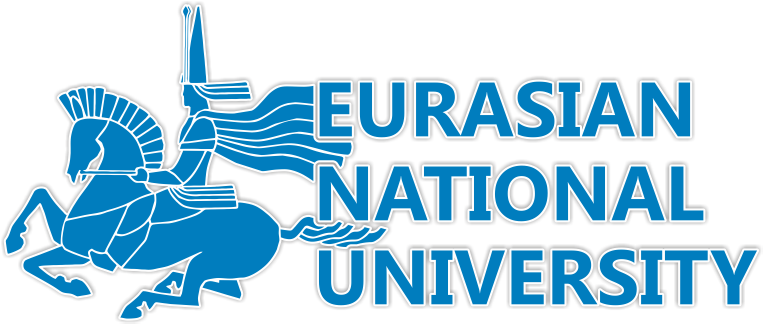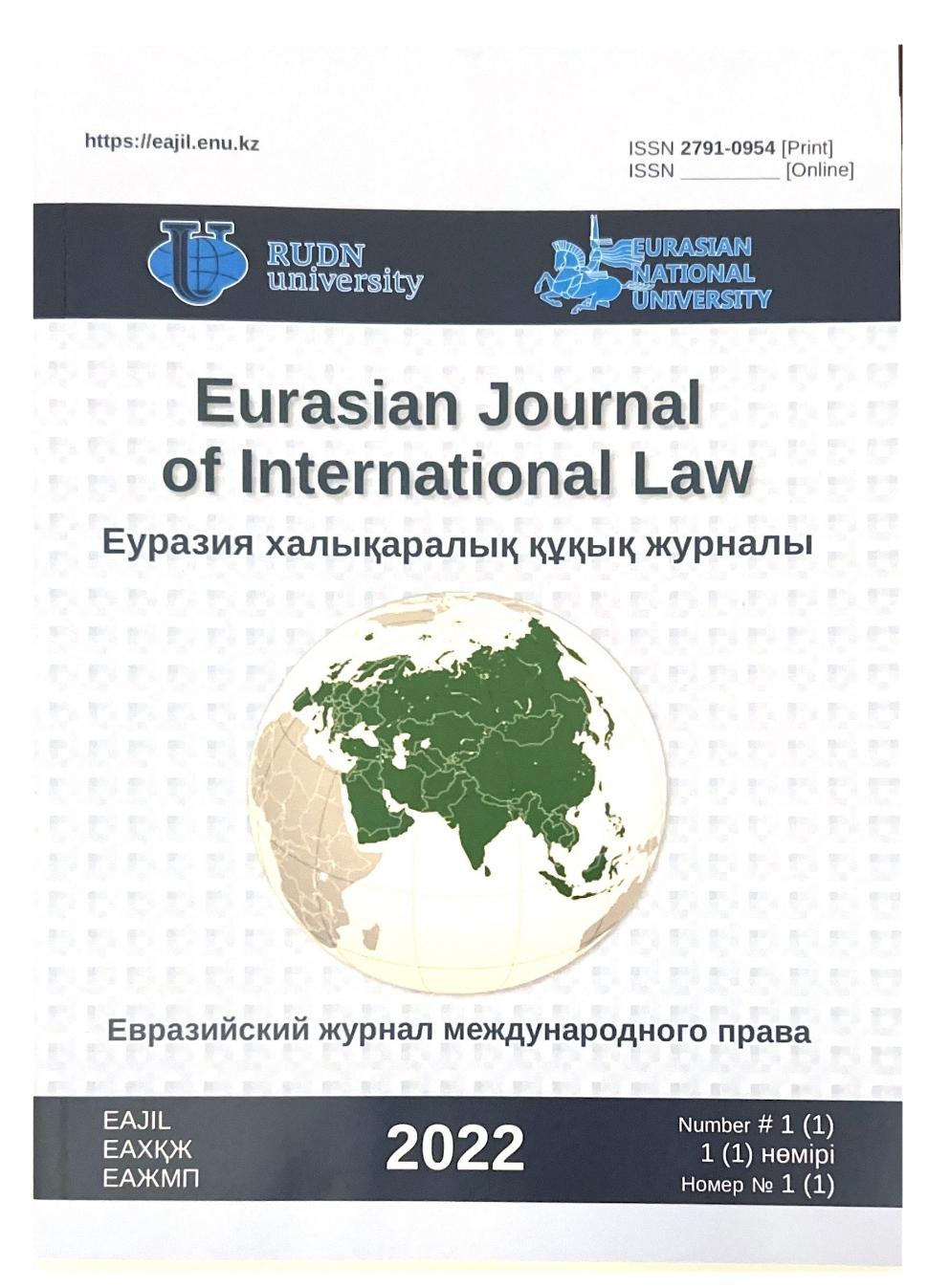On September 27, 2022, the first issue of the Eurasian Journal of International Law (EAJIL) was published.
Chief editors of the journal: Abaideldinov E.M., Doctor of Law, Professor, Professor at the Department of International Law, L.N. Gumilyov Eurasian National University (Astana, Republic of Kazakhstan); Abashidze A.Kh., Doctor of Law, Professor, Head of the Department of International Law, RUDN University – The Peoples' Friendship University of Russia (PFUR) (Moscow, Russian Federation). Executive Secretary: Tlepina Sh.V., Doctor of Law, Professor, Head of the Department of International Law, L.N. Gumilyov Eurasian National University (Astana, Republic of Kazakhstan). Technical secretaries: Zhunusbekova A.Zh., PhD, L.N. Gumilyov Eurasian National University (Astana, Republic of Kazakhstan); Mikheeva V.I., Postgraduate, PFUR (Moscow, Russian Federation).
Editorial board of the journal: Abdullin A.I. – Doctor of Law, Professor, Head of the Department of International and European Law, Kazan Federal University (Kazan, Russian Federation); Borubashov B. I. – Doctor of Law, Professor, Head of the Department of International and Constitutional Law, Kyrgyz-Russian Slavic University (Bishkek, Kyrgyz Republic); Dovgan Ye.F. – Doctor of Law, Professor, Professor at the Department of International Law, Belarusian State University (Minsk, Republic of Belarus); Kulzhabayeva Zh.O. – Candidate of Legal Sciences, Associate Professor, Advisor to the Director of the Institute of Legislation and Legal Information of the Republic of Kazakhstan (Nur-Sultan, Republic of Kazakhstan); Kulikpayeva M. – PhD, Head of the Department of International Law and Comparative Legal Studies of the RSE on REM “Institute of Legislation and Legal Information of the Republic of Kazakhstan” of the Ministry of Justice of the Republic of Kazakhstan (Nur-Sultan, Republic of Kazakhstan); Nigmatullin R.V. – Doctor of Law, Professor, Deputy Director for International Affairs and Public Relations at the Institute of Law, Head of the Department of International Law and International Relations, Bashkir State University (Ufa, Russian Federation); Saidov Kh.Kh. – PhD in Law, Associate Professor, Head of the Department of International Law, Tajik National University (Dushanbe, Republic of Tajikistan); Sairambayeva Zh.T. – PhD in Law, Associate Professor, Head of the Department of International Law, Al-Farabi Kazakh National University (Almaty, Republic of Kazakhstan); Sarsembayev M.A. – Doctor of Law, Professor, Professor at the Department of International Law, L.N. Gumilyov Eurasian National University (Nur-Sultan, Republic of Kazakhstan).
In the first issue of the journal were published message from the editors-in-chief- Abashidze A.Kh., Abaideldinov E.M., welcome address by the Chairman of the Board – Rector of the L.N. Gumilyov ENU – Sydykov E.B., Welcome address by the Rector of PFUR – Yastrebov O.A.
The authors who published their articles in the first issue of the journal are Doctor of Law, Professor, Head of the Department of International Law of the PFUR Abashidze A.Kh.; Doctor of Law, Professor, Professor at the Department of International Law, Belarusian State University Dovgan Ye.F.; Doctor of Law, Professor, Professor at the Department of International Law, L.N. Gumilyov ENU Sarsembayev M.A.; PhD in Law, Associate Professor, Head of the Department of International Law, Al-Farabi Kazakh National University Sairambayeva Zh.T. and doctoral student Nurtay M.N.; as well as Young scientists – postgraduate student of the Department of International Law of the PFUR Latypova A.F., doctoral student of the Department of International Law of the L.N. Gumilyov ENU Salykova D.O.
The article of the professor Abashidze A.Kh. «Universal human rights mechanism on guard of preservation or revision of the institution of family» have attempts to comprehensively analyze the institution of family, which is enshrined in the Universal Declaration of Human Rights (UDHR) and in two International Covenants on Human Rights - the International Covenant on Civil and Political Rights (ICCPR) and the International Covenant on Economic, Social and Cultural Rights (ICESCR), which together with the UDHR form the International Bill of Human Rights.
The article examines the views of relevant treaty bodies empowered to monitor the implementation of the International Covenants on Human Rights by States parties, represented by the Human Rights Committee and the Committee on Economic, Social and Cultural Rights in relation to the institution of the family, expressed by them in their general comments and related concluding observations on the periodic reports of States parties to the International Covenants.
The opinions of the European Court of Human Rights and other human rights treaty bodies in relation to the institution of the family are also presented in comparative order.
The article emphasizes that the preservation of the approach that was laid down in the institution of family in the relevant International Covenants on Human Rights, as well as deviations from it, which the author qualifies as ultra vires powers vested in the relevant human rights treaty bodies.
The article of the professor Dovgan Ye.F. «International obligations of parts of state territory from peremptory norms of international law» focuses on the principles of identification of the scope of international rights and duties raising from peremptory norms of international law, of parts of state territory, including occupied territories, self-proclaimed states, oversea territories. The article concludes that parts of state territory, regardless of their status, are obliged to observe peremptory norms of international law. The latter are also binding upon all states towards parts of state territory with or without the possibility to exercise control over it, especially as regards international humanitarian law and human rights law.
The article of the professor Sarsembayev M.A. «Legal aspects of Kazakhstan's cooperation with the USA, Germany, Russia, France, South Korea, Japan to identify factors hinderingthe transition to digitalization of transport engineering» analyzes the issues of possible cooperation of the Republic of Kazakhstan with the developed countries: the USA, Germany, Russia, France, South Korea, Japan in connection with the need to identify obstacles that hinder the process of digitalization of transport engineering. The study of the main issues of the topic of the article is carried out on the basis of the method of logical analysis, the historical and legal method, the method of comparative legal analysis. The barriers identified by Western experts and analysts that hinder factories and the transport engineering industry in their transition to digitalization are consistently presented and formulated. Each factor (barrier) is critically investigated, analyzed from the point of view of their possible manifestation in Kazakhstan's practice of introducing digital technologies into industrial, machine-building production. The methods and means proposed by experts and researchers of Western countries to overcome these barriers and the possibilities of their use in domestic practice have been carefully studied. The author suggests additional methods of removing barriers in the form of the development and adoption of new Kazakh laws, as well as agreements of Kazakhstan with the above mentioned advanced states and their concerns on cooperation to solve the problems of introducing digital technologies into the activities of factories and the transport engineering industry of the republic.
The article of the professor Sairambayeva Zh.T. and doctoral student Nurtay M.N. discusses the general characteristics and features of the legal regulation of intellectual property within the EU. It also analyzes the main reasons for the protection of intellectual property rights of the EU and the main directions of its activities, in particular, the convergence of national standards of protection. Special attention was paid to the analysis of the main tasks facing the EU legislation in the field of intellectual property protection and the fundamental documents of the policy in the field of copyright and related rights. At the same time, there is a link between the protection of intellectual property rights in the EU and the terms of the WTO Agreement on TRIPS Agreement. As part of the study, the authors establish that the experience of intellectual property rights protection among the EU member states is at a fairly high level, and conclude that it contributes to the active development of innovation in a number of countries.
The article of the postgraduate student Latypova A.F. «Artificial Intelligence and International Law» attempts to reveal the basic concepts and to analyze the prospects of the current state of AI regulation, as well as to draw cautious conclusions about further development of this issue through the perspective of international law, including the extent to which the current provisions of international law can meet the challenges posed by the use of the latest technologies based on artificial intelligence.
The article of the doctoral student Salykova D.O. «The evolution of the idea of international criminal justice and international criminal justice bodies» is devoted to the genesis of idea of international criminal justice and international criminal justice bodies. The author examines historical facts, philosophical works, scientific publications of professors of near and far abroad on international law, analyzes international treaties in order to determine chronology of the evolution of international criminal justice and its bodies from idea to legal regulation within the framework of modern international criminal law. The author also studied the provisions of the Versailles Peace Treaty, documents of the League of Nations regarding the draft Convention on the creation of an international criminal court, a brief review of the constituent documents for the establishment of ad hoc tribunals and the International Criminal Court. Based on the analysis, author offers his own vision of the definitions of “international criminal justice” and “international criminal justice bodies”.
Official website of the journal: https://eajil.enu.kz


